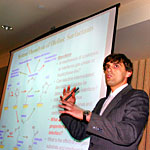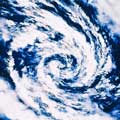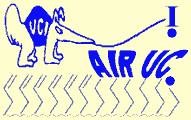|

|
Graduate Research
If
you are interested in joining our group as a graduate student please contact Prof. Sergey Nizkorodov. We generally accept graduate students
from Chemistry or ChAMP programs. To enroll in one of these programs, you have to be admitted to UCI Graduate School (applications are typically due in December for the following academic year). Before you joining the group, you strongly encouraged to attend the group seminars, read recent publications from the group, and talk to the current group members.
Once you are in the group, you have to fulfil the requirements of the graduate program you are part of (such as the Chemistry graduate program). The requirements for graduate students that are specific to this group are outlined in the syllabi for the following two courses you are expected to enroll in:
- Chem 280: Research (2-12 units) is your primary course starting from year two of graduate school. For GSR-supported students, it is normal to sign up for 8-12 units of Chem 280 and 4 units of Chem 291 in years 2-5. For TA-supported students, some of the 280 units are replaced by Chem 399 (University Teaching, 1-4 units).
- Chem 291: Research Seminar (4 units). This is our weekly group meeting. While it is listed as a 4 hour course in the catalogues, the actual time commitment is less than 2 hours per week.
Top
Undergraduate Research
Undergraduate students are welcome to join the Aerosol Photochemistry Laboratory for their
undergraduate research projects on a space available basis.
We typically have 1-3 undergraduate students at any given time. The
usual mechanism for this is enrollment in Chem 180/H180 (lab research) or Chem 199 (independent study, please refer to the list of possible Chem 199 topics). Depending on the nature of the project you will be
advised either directly by Prof. Nizkorodov or by one of his graduate
students. If you are
interested in such an opportunity please contact Sergey Nizkorodov well in advance. Send your resume, transcript, and a representative sample of your technical writing (e.g., one of your lab reports) with your inquiry. If you took classes with Dr. Nizkorodov before, be sure to mention it.
Typical prerequisites for Chem 180, 199, and H180 enrollment
- We prefer junior students with some level of laboratory experience, ideally in at least two UCI chemistry laboratory courses beyond general chemistry (Chem M3LC, 51LABC, 107L, 128L, 133L, 152, 153, 156, 160, 177L, etc.).
- In some cases, we do accept freshman and sophomore students. The students would typically have a GPA of around 4.0 and/or some other indication that they can afford additional time taken by research (see below).
- An entrance interview with Prof. Nizkorodov and his group members is required for all students.
Syllabus and academic year requirements for Chem 180 and H180 students
- Enroll for all 3 quarters (fall, winter and spring). Therefore, a good time to inquire about the availability of research position for the next fall is spring of the previous year.
- Pass all the necessary safety training before starting lab work and follow all the lab safety protocols.
- Plan to spend at least 12 hours per week on research (since Chem 180 and Chem H180 are 4 unit courses). This requires at leats two full mornings or afternoons that are free of classes. Construct your course schedule with that in mind.
- Attend weekly group meetings and other scheduled lab activities. You may be asked to present at one of these meetings.
- Submit weekly progress reports to Prof. Nizkorodov and your graduate student co-mentor. This report should summarize results of your lab work since the previous report. Typically, it is a Word or PowerPoint file containing procedures, diagrams, tables, graphs, and your notes on how to interpret the data. This is not meant to replace you lab notebook. Writing things in your lab notebook during the experiment is of course essential. But notebooks often contain too much technical information, and it is important to distill the information down to the key elements of the procedure and key results, and outline the next steps. The report frequency depends on how time consuming your data analysis is:
- Daily reports are the most suitable for summer students, who work in the lab on a daily basis, and in cases when the data analysis can be done quickly. This is an example of a daily report (prepared in MS Word and exported to PDF).
- Weekly reports make more sense for academic year students, who show up in the lab once or twice every week. Even if you work every day, but the experiment itself is relatively short and the analysis of results is time consuming, weekly reports make more sense. Here is an example of a weekly report (prepared in PowerPoint and exported to PDF).
- If you did no lab work, for example, because your instrument was broken, you should read a research paper or a book chapter on the subject of your research and make a summary of that. Here is an example of a paper report.
- Please name your report using the convention "YYYYMMDD_description.extension" and e-mil it to your advisors (you may also be asked to upload it to your designated shared folder).
- Keep all of your data files highly organized on your computer. You must do daily backups of data on a secure server. When you are ready to leave the group, you must transfer all of your data and your lab notebook to the PI. Please adopt the following convention for naming your data files:
- Put all files for the same type of the experiment in a different folder
- File name should have the format: "YYYYMMDD_description.extension" for example "20181102_absorption_spectra_of_TOL_SOA_in_CH3OH.xlsx"
- If using Excel, give data columns informative names and insert many comments in the data so that others can understand what you were doing. Include relevant graphs with your data.
- Prepare a written report and a presentation at the end of each quarter summarizing your research accomplishments and outlining plans for the next quarter. Your report should be 3-5 pages long, and contain the most important results in the form of graphs and tables. Your presentation should be about 20 slides long, and contain all the parts that presentations usually consist of: introductions, summary of objectives, key results, discussion points, summary, and acknowledgments.
- Students will be encouraged to apply for UROP support, present their research at the undergraduate research symposium, and submit papers to the UROP journal.
- Your formal grade will depend on the quality of your reports, amount of work accomplished, group seminar attendance, etc. Most students who worked in the lab before earned "A" for their work.
Summer employment for UCI undergraduate students
We occasionally (if there are available funds) have paid undergraduate research positions for full-time UCI undergraduate students who satisfy one of the following requirements:
- They previously spent one academic year in our lab doing research for credit (Chem 180 or H180)
- They can demonstrate appropriate level of R&D training (e.g., through past industrial employment)
- They come with they own summer stipends
Internships for high-school students
We no longer accept applications for high-school internship positions.
Useful resources for junior researchers starting their research in our lab
- Introduction to Atmospheric Chemistry, by Daniel J. Jacob, Princeton University Press, 1999 - great starting book for atmospheric chemistry; available for free as an electronic resource here
- Representative publications from the group to which undergraduate or high school students made a major contribution (each one will take you to the group's paper list where you can view the corresponding paper by clicking on the PDF link).
- Aerosol photochemistry: publications 90, 104, 107, 110, 126, 158, 174
- Primary and secondary aerosol from fires: publications 161, 188, 190
- Organic aerosol chemistry: publications 62, 72, 77, 105, 119, 125, 181, 184
- Indoor and ozone chemistry: publications 45, 49, 52
- The group has a small library of books on atmospheric chemistry that can be checked from Prof. Nizkorodov.
How to request a support letter for your medical or graduate school application?
Please
ask me well before the reference letter submission deadline, and provide
me with instructions about where the letter is supposed to go to. In addition, I am going to need your resume, your transcript, essays you may have written for your admission application, and as much relevant information about yourself as you can provide.
Top
Outreach
Summer teacher training program in environmental chemistry
Prof. Nizkorodov coordinated the summer teacher workshop in Environmental Chemistry for grade 8-12
science teachers. It was the main outreach effort of the AirUCI team. The program was fully sponsored by NSF. This
two-week training program focused on hands-on lab
work on selected environmental monitoring problems.
Supporting lectures were offered by AirUCI faculty members. The program was limited to 20 teachers on a first-come
first-serve basis. Please refer
to the class
website for more information.
Other outreach activities
Prof. Nizkorodov and his group members have participated in the following activities:
- Organizing lab tours for groups of middle-school and high-school teachers and students
- Judging Science Fairs
- Organizing on-site demos in various schools
- Giving public talks on the topics of air pollution
- Lecturing for the UCI COSMOS program (California State Summer School for Mathematics
& Science)
- Lecturing for the Osher
Lifelong Learning Institute
Top
Lectures
A list of courses Prof. Nizkorodov has taught can be found in his full CV.
Video recording of brown carbon tutorial by Prof. Sergey Nizkorodov in August 2020
Top |


